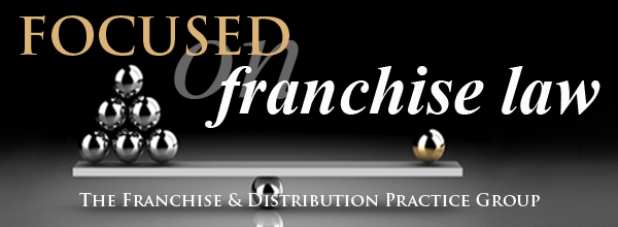Franchisor 101: Easier SBA Loan Approvals; and Perpetual Agreements

bkurtz@lewitthackman.com
dgurnick@lewitthackman.com
tgrinblat@lewitthackman.com
swolf@lewitthackman.com
msoroky@lewitthackman.com
kwallman@lewitthackman.com
tvernon@lewitthackman.com
February 2017
Barry Kurtz in Practical Lawyer
“Is the business sustainable in the marketplace? Franchises built on fad products or services rarely survive. To be sustainable, the business concept should be unique enough to withstand competition…” Click to read: How to Lead Your Clients to the Purchase of a Franchise
Our Attorneys Recognized
Barry Kurtz, Tal Grinblat and David Gurnick were named 2017 SoCal Super Lawyers in the Franchise/Dealership category. Only 12 attorneys in the entire region were so named. All three are also Certified Specialists in Franchise & Distribution Law, as designated by the State Bar of California Board of Legal Specialization — less than 60 attorneys in the entire state share that distinction.
New Team Member!
We are pleased to announce that Matthew J. Soroky joined our Practice Group as an associate. He has nearly 10 years’ experience in business litigation – and has devoted the last several years to franchise, distribution, licensing and intellectual property matters in both the transactional and litigation contexts. We look forward to introducing our clients to our newest team member.
FRANCHISOR 101:
Simplification of SBA Loan Approvals

As independent small business operators, franchisees may qualify for business loans that are guaranteed by the Small Business Administration (“SBA loans”). However, the SBA considers certain types and levels of control exerted by franchisors over franchisees to create an “affiliation” between them, disqualifying controlled franchisees for the loans because the SBA does not consider them “independent.”
Previously, a franchisor could draft an addendum to its Franchise Agreement to remove these controls and, after the addendum and Franchise Agreement were reviewed and approved annually by the SBA or an affiliate organization, franchisees signing the addendum could receive approval for SBA loans. This process was costly and time consuming.
However, as of January 1, 2017, the SBA simplified this process by prescribing a single form of addendum (the “SBA Addendum”) that will make any Franchise Agreement kosher. Franchisors are now required to use these 2-page forms to qualify their franchisees for SBA loans, but now no review or approval by the SBA is needed.
SBA Addendums remain effective until either the underlying loan is paid off or the SBA no longer has any interest in the loan. In summary, the addendums modify Franchise Agreements as follows:
- Change of Ownership: 1) The franchisor has no right of first refusal if the franchisee wants to transfer a partial interest in the franchise to a family member or one of the franchise’s present owners. 2) The franchisor cannot unreasonably withhold consent to any proposed transfer. 3) After a transfer, the transferor cannot be held liable for the actions of the transferee.
- Forced Sale of Assets: Upon the default or termination of a franchise: 1) If the franchisor exercises a right to force the franchisee to sell it the assets of the business but the parties cannot agree on a price, then the price will be determined by an appraiser appointed jointly by the parties. 2) If the franchisee owns the real estate where the franchise was located, then the franchisor cannot compel the franchisee to sell it the property, but rather only to lease it for fair market value for the remainder of the franchise’s term.
- Covenants: If a franchisee owns the real estate where the franchise is located, the franchisor cannot require the recording of any restrictions on the use of the property.
- Employment: The franchisor may not directly hire or fire the franchisee’s employees.
This simplification of obtaining approval for SBA loans will save the SBA time and money, while simultaneously allowing franchisors and franchisees to benefit from SBA loans.
FRANCHISEE 101:
A Perpetual Franchise

When a franchisee “buys into” a franchise system by paying an “initial franchise fee,” the franchisee is typically purchasing the right to use the franchisor’s trademarks and business system for an initial term that lasts a certain number of years (usually between 5 and 20).
The franchisor may hope to continue its relationship with the franchisee far beyond this initial term, but nevertheless limits the term in this way so that it can periodically revise the details of the relationship with an updated agreement. The franchisee, by contrast, would understandably prefer that those details remain known and consistent as long as possible.
In H&R Block Tax Services, LLC v. Strauss, Strauss, an H&R Block franchisee, claimed that her Franchise Agreement was effectively “perpetual” and not subject to the kinds of revisions described above. The Franchise Agreement between stated that its term was 5 years and that, unless Strauss was in default, the Franchise Agreement would be “automatically renewed for successive Renewal Terms [of 5 years each].” Strauss operated for 30 years under this agreement until H&R Block told her that it would not renew, but invited Strauss to sign its “current form” of Franchise Agreement. Strauss claimed that the franchisor could not decline to renew the agreement and therefore had effectively just breached the agreement.
A federal court determined that relevant Missouri precedent required that “a contract which purports to run in perpetuity must be adamantly clear that this is the parties’ intent.” The language in the Franchise Agreement did not meet this standard, and therefore the court found that H&R Block was within its rights to decline to renew it perpetually.
A franchisee that is interested in a “perpetual” Franchise Agreement should be sure that the language in the agreement is explicit on the subject, and should consult with legal counsel before signing to verify that the language meets the standards of relevant state law.
Read: H&R Block Tax Services, LLC v. Strauss
